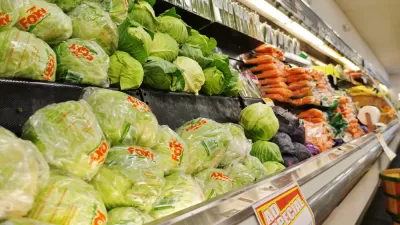According to one recent study, regional culture plays a major part in how healthily people eat. Supply may be less of a factor than demand.

Urbanist debates around healthy eating often focus on food deserts: places where healthy options aren't readily available. But according to this study, regional tastes and cultural preference may play a larger role.
As Caitlin Dewey puts it, "For years, advocates have argued that it's largely a problem of access: Consumers eat junk because they can't afford healthful foods or can't find them in their communities. Now, an emerging body of research suggests that some groups of consumers may simply be less interested than others in buying healthful groceries."
Lead author Hunt Allcott "hypothesizes that a region's dominant cuisine, be that barbecue or avocado toast, informs the meals that people eat as children. That, in turn, has a large effect on their lifelong food preferences."
The study calls out Montana's Musselshell County for its particularly unhealthful food purchases. Apparently, readers from Musselshell fired back, noting that "residents often supplement their diets with items from hunting trips and home gardens, meaning that they may be eating more healthfully than measurable data indicates."
FULL STORY: This is the U.S. county that buys the least healthful groceries

Planetizen Federal Action Tracker
A weekly monitor of how Trump’s orders and actions are impacting planners and planning in America.

San Francisco's School District Spent $105M To Build Affordable Housing for Teachers — And That's Just the Beginning
SFUSD joins a growing list of school districts using their land holdings to address housing affordability challenges faced by their own employees.

The Tiny, Adorable $7,000 Car Turning Japan Onto EVs
The single seat Mibot charges from a regular plug as quickly as an iPad, and is about half the price of an average EV.

Seattle's Plan for Adopting Driverless Cars
Equity, safety, accessibility and affordability are front of mind as the city prepares for robotaxis and other autonomous vehicles.

As Trump Phases Out FEMA, Is It Time to Flee the Floodplains?
With less federal funding available for disaster relief efforts, the need to relocate at-risk communities is more urgent than ever.

With Protected Lanes, 460% More People Commute by Bike
For those needing more ammo, more data proving what we already knew is here.
Urban Design for Planners 1: Software Tools
This six-course series explores essential urban design concepts using open source software and equips planners with the tools they need to participate fully in the urban design process.
Planning for Universal Design
Learn the tools for implementing Universal Design in planning regulations.
Smith Gee Studio
City of Charlotte
City of Camden Redevelopment Agency
City of Astoria
Transportation Research & Education Center (TREC) at Portland State University
US High Speed Rail Association
City of Camden Redevelopment Agency
Municipality of Princeton (NJ)



























